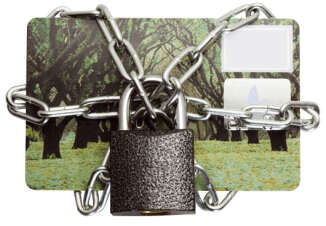The content on this page is accurate as of the posting date; however, some of the offers mentioned may have expired.

We are so much concerned about privacy and security issues that we are desperate to do anything to avoid being ID victims. However, most of us do not mind carrying Radio Frequency Identification tags embedded in our passports, credit cards and even clothes. On the contrary, FRID chips go a long way among US consumers and enjoy financial support from credit card and other financial companies, as well as from automotive and security industries.
Meanwhile, a growing number of financial and security experts are expressing concerns about the real protecting efficiency of RFID chips. What are the chips intended for in credit cards and are they really that necessary to be embedded in our cloths or passports?
Most of cardholders do not deny the evident convenience and ID security they enjoy using credit cards with RFID . Credit cards with RFID chips are produced on the no-swipe basis and ensure the security of personal and financial information of the customer during the transaction.
It is simple. You do not have to give your plastic to the cashier, protecting it from unauthorized readout and theft of your name, account number or expiration date.
Earlier, the only way to allow a customer to charge with a credit card was through scanning the card's information with store readers, bank computers and ATMs. The latter have recently become too easily exposed to criminals' ideas about how to steal your credit card information for fraudulent activity and ID theft.
RFID chips have brought around a smart solution to security issues concerning card usage.
However, these silicon chips found their application in car keys, prescription bottles and even our clothes.
What is there role? Whom do they help and whose interests do they protect? The RFID technology helps identify company employees, track shipments of goods through stores, speed up retail transactions and find pirated merchandise.
In other words, RFID technology allows authorities to put a US citizen under control, watching where you go and what you do any time of the day and night. Let alone full access to your personal information.
Strange enough, but while no swipe credit cards do make a difference as to how you pay for a purchase, chips contained in other everyday items seem to be not only useless for a customer but also privacy threatening.
Why wear a shirt transmitting signals that are easily exposed to criminals armed with special readers trying to steal your identity? It has also become dangerous to carry your passport about as it is an excellent source of easy-to-read personal and financial information.
The concerns sprang the development of a new area in the security industry - companies producing passport sleeves, metal-covered wallets and other devices protecting your credit cards, keys, passports and other RFID-enabled items.
The technology is still, however, to beg a big question. How will consumers wearing RFID tags in their shirts or shoes be protected? Else, there is a guessing that RFDI tags will be implanted under a person's skin one day, making the person utterly defenseless in the face of ID theft threat.
What role will chips in you skin play? While they do not seem to shield you from ID theft, they do seem to be the Government's perfect tool to watch and control citizens for the national safety purposes.
Isn't there a small contradiction? Even if there is, consumers who have been offered to have RFID chips implanted showed willingness and readiness to go through the procedure. Why not, they say, if the chips help Government in the fight against terrorism?
Praiseworthy, but a little bit too naive. RFID technology used in credit card industry is really justified and should not perhaps go beyond it.





